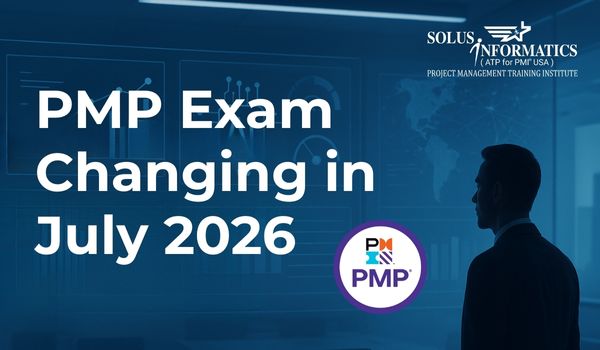The Project Management Professional (PMP)® certification is a widely recognized credential that demonstrates a project manager’s skills, dedication, and knowledge in the field. While earning this certification can significantly advance one’s career, passing the PMP exam is no small feat. Many professionals face common obstacles that can impact their preparation and test-taking experience. In this article, we will discuss some of the most common challenges in passing the PMP exam and offer practical strategies to help you overcome them, ensuring that you’re well-prepared to succeed.
1. Understanding the PMP Exam Structure
Challenge: The PMP exam has evolved to emphasize agile and hybrid approaches, making it essential to adapt your study strategy. The exam now covers a broader range of topics, including agile methodologies, leadership skills, and strategic thinking.
Solution: Begin by familiarizing yourself with the latest PMBOK® Guide and the revised PMP exam content outline. Focus on understanding the three domains: People, Process, and Business Environment. Utilize online resources, study guides, and practice exams to gain insights into the exam format and question types. Consider joining a study group or online community to discuss concepts, share experiences, and stay motivated.
2. Time Management in Preparation
Challenge: Balancing work, personal life, and PMP exam preparation can be demanding. With the increased complexity of the exam, it’s crucial to allocate sufficient time for effective study.
Solution: Create a realistic study plan that aligns with your schedule and lifestyle. Break down your study materials into smaller, manageable chunks, and focus on consistent, short study sessions. Consider using online learning platforms, such as Solus Informatics’ Online PMP Training, which offer flexible learning options and expert guidance. Remember to take breaks and prioritize self-care to avoid burnout and maintain optimal focus.
3. Mastering Complex PMP Terminology and Concepts
Challenge: The PMP exam continues to evolve, introducing new concepts and terminology, particularly related to agile and hybrid methodologies. Understanding these concepts is crucial for success.
Solution: Utilize flashcards and create mind maps to visualize complex concepts. Practice explaining these concepts to others to solidify your understanding. Consider joining a study group or online forum to discuss challenging topics with peers. Pay special attention to the latest PMBOK® Guide and focus on understanding the core principles of project management.
4. Handling Scenario-Based Questions
Challenge: The PMP exam heavily relies on scenario-based questions to assess your practical application of project management knowledge. These questions often require critical thinking and problem-solving skills.
Solution: Practice with a wide range of scenario-based questions from reliable sources, such as official PMI practice tests and reputable third-party providers. Analyze the questions carefully, identify the key information, and apply your knowledge to select the best answer. Consider using a problem-solving framework, like the PDCA cycle, to approach complex scenarios. Additionally, practice time management techniques to ensure you allocate sufficient time to each question.
5. Managing Test Anxiety and Stress
Challenge: The PMP exam is known for being challenging, and the stress of preparing for it can lead to anxiety, which may hinder performance on the test day.
Solution: Combat test anxiety by adopting relaxation techniques such as deep breathing exercises, mindfulness, and visualization. Practice exams can also help build familiarity, which can reduce anxiety levels. A healthy diet, proper sleep, and regular exercise can all contribute to reducing stress. Additionally, try to maintain a positive mindset and remind yourself of your hard work and preparation leading up to the exam.
6. Retaining Key Information Over Time
Challenge: The extensive scope of the PMP syllabus makes it easy to forget material you’ve studied earlier. Keeping track of what you’ve learned and ensuring it sticks can be tough, especially closer to the exam date.
Solution: Use spaced repetition techniques to retain key information over time. Reviewing previously studied material in intervals, such as every few days, can improve retention. Additionally, write summaries of complex topics in your own words and review these notes regularly. Practice tests can also help reinforce important concepts while testing your memory.
7. Dealing with Math and Formula-Based Questions
Challenge: PMP exams include calculations and formula-based questions that require knowledge of Earned Value Management (EVM) formulas, scheduling techniques, and other project management metrics.
Solution: Start by memorizing the key formulas and practicing their application through example questions. Break down complex formulas into simpler components to make them easier to understand. Practice makes perfect, so regularly solve math-related questions to build your confidence. Many candidates find it helpful to write down the formulas on a “cheat sheet” during study sessions, which can reinforce memory through repetition.
8. Balancing Agile and Traditional Project Management Approaches
Challenge: The PMP exam has evolved to include both agile and traditional project management methodologies. This blend of methodologies can create confusion if you’re not familiar with agile concepts.
Solution: Begin by understanding the key principles and practices of agile methodologies, such as Scrum and Kanban, as well as how they differ from traditional project management. Use comparison charts to map out differences, similarities, and best practices of each approach. Many PMP training programs offer specific modules for agile, which can help you focus on essential agile concepts without confusion.
9. Financial and Logistical Barriers to PMP Preparation
Challenge: PMP training courses, study materials, and exam fees can be expensive, and some candidates find it difficult to justify or afford the investment.
Solution: Look for training programs that offer flexible payment plans or employer sponsorship. Many organizations are willing to cover part or all of the costs for employees seeking certification. Additionally, you can leverage free or low-cost online resources, including sample questions, podcasts, and study groups. Solus Informatics offers flexible and affordable options for Online PMP Certification Training, making it easier to access high-quality resources without straining your budget.
Final Tips to Boost Your PMP Exam Success
1. Start Early: Give yourself ample time to study by starting at least three to six months before your exam date.
2. Take Breaks: Avoid burnout by taking short breaks between study sessions and celebrating small milestones.
3. Seek Support: Joining a PMP study group or connecting with other PMP aspirants can offer both motivation and a chance to clarify doubts.
While the PMP exam presents several challenges, with a structured study plan, effective time management, and access to reliable resources, you can overcome these obstacles. The key is to stay consistent, focused, and proactive in addressing each hurdle. Solus Informatics offers Online PMP Training tailored to help candidates overcome these common challenges, providing you with the tools and support needed to pass the PMP exam with confidence. Remember, the hard work you put into your PMP certification journey will ultimately pay off, opening doors to greater career opportunities and growth in project management.




